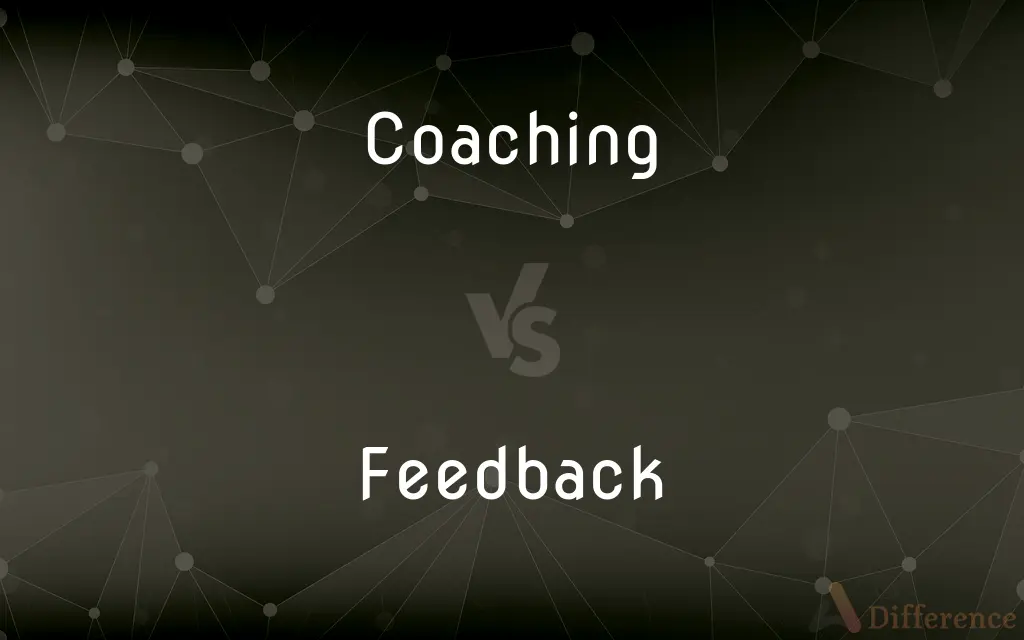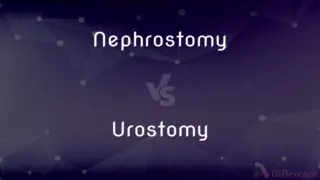Coaching vs. Feedback — What's the Difference?
By Tayyaba Rehman & Fiza Rafique — Updated on April 15, 2024
Coaching is a continuous, developmental process focused on enhancing skills or performance, while feedback is specific information given about particular actions or behaviors.

Difference Between Coaching and Feedback
Table of Contents
ADVERTISEMENT
Key Differences
Coaching involves a structured, ongoing interaction where a coach supports a person in achieving specific personal or professional goals through training and guidance. This process is often holistic and long-term, aiming to develop the individual's capabilities and capacity. On the other hand, feedback is usually a more immediate response to a specific action or behavior, intended to inform the recipient about what they did well or what needs improvement.
The role of a coach is to ask questions that encourage self-reflection and discovery, facilitating personal growth and skill enhancement. Coaches help individuals explore solutions and new ways of overcoming challenges. Whereas feedback, whether positive or negative, is generally directive and focused on particular instances. It provides insights or corrections based on observations and is often critical for short-term improvements.
Coaching is typically a voluntary and sought-after relationship; individuals choose to work with a coach to refine skills or change behaviors over time. In contrast, feedback can be unsolicited and is a common component of educational and professional environments. It serves as a tool for guiding immediate actions and ensuring standards are met.
The approach in coaching is predominantly collaborative, with the coach working as a partner who helps unlock a person's potential. This method fosters a supportive atmosphere where the coachee is motivated to develop. Feedback, however, is usually more straightforward and less about personal development and more about achieving or maintaining a certain level of competency or performance.
The duration and frequency of coaching sessions can vary, but the relationship is generally sustained over a period to observe and discuss progress and setbacks. Feedback, however, might be given on the spot or shortly after the observed behavior, with follow-ups varying based on the context and the severity of issues addressed.
ADVERTISEMENT
Comparison Chart
Purpose
Enhance skills or performance through ongoing support
Provide specific information on actions or behavior
Method
Structured, reflective, and exploratory
Immediate, directive, and observational
Relationship
Long-term, developmental, and collaborative
Can be short-term and need-based
Frequency
Regular sessions over an extended period
As needed, often after specific instances
Focus
Personal growth and long-term improvement
Immediate correction or confirmation of behavior
Compare with Definitions
Coaching
A profession involving advising, mentoring, and supporting clients.
He hired a career coach to navigate his job transition.
Feedback
Information provided about someone's performance or behavior.
He appreciated the constructive feedback from his supervisor.
Coaching
The use of techniques to enhance performance in various fields.
Executive coaching is popular among corporate leaders.
Feedback
Input from others that can guide future behaviors.
Feedback from her mentor helped her focus her research efforts.
Coaching
The practice of training individuals or teams in sports.
His coaching led the team to a national championship.
Feedback
Reactions or responses that inform how one is perceived.
Her presentation style changed after receiving feedback.
Coaching
A developmental process where a more experienced person helps another achieve specific goals.
She received coaching to improve her leadership skills.
Feedback
A response given to a particular action or event.
The audience's feedback was overwhelmingly positive.
Coaching
The act of guiding someone to learn or improve in an area.
The team underwent coaching for better communication.
Feedback
Critique or evaluations used to improve efficiency.
The software developer used user feedback to refine the app.
Coaching
Coaching is a form of development in which an experienced person, called a coach, supports a learner or client in achieving a specific personal or professional goal by providing training and guidance. The learner is sometimes called a coachee.
Feedback
Feedback occurs when outputs of a system are routed back as inputs as part of a chain of cause-and-effect that forms a circuit or loop. The system can then be said to feed back into itself.
Coaching
A bus, especially one designed for long-distance passenger service.
Feedback
The return of a portion of the output of a process or system to the input, especially when used to maintain performance or to control a system or process.
Coaching
A railroad passenger car.
Feedback
The portion of the output so returned.
Coaching
A closed automobile, usually with two doors.
Feedback
Sound created when a transducer, such as a microphone or the pickup of an electric guitar, picks up sound from a speaker connected to an amplifier and regenerates it back through the amplifier.
Coaching
A large, closed, four-wheeled carriage with an elevated exterior seat for the driver; a stagecoach.
Feedback
The return of information about the result of a process or activity; evaluative response
Asked the students for feedback on the new curriculum.
Coaching
Coach class.
Feedback
The process by which a system, often biological or ecological, is modulated, controlled, or changed by the product, output, or response it produces.
Coaching
(Sports) A person who trains or directs athletes or athletic teams.
Feedback
Critical assessment of a process or activity or of their results.
After you hand in your essays, I will give both grades and feedback.
Coaching
A person who gives instruction or guidance
An acting coach.
A life coach.
Feedback
The part of an output signal that is looped back into the input to control or modify a system.
Coaching
A private tutor employed to prepare a student for an examination.
Feedback
The high-pitched howling noise heard when there is a loop between a microphone and a speaker.
Coaching
To train or tutor or to act as a trainer or tutor.
Feedback
(music) To generate the high-frequency sound by allowing a speaker to cause vibration of the sound generator of a musical instrument connected by an amplifier to the speaker.
The show ended with a riot of feedbacking guitars.
Coaching
To transport by or ride in a coach.
Feedback
(transitive) To provide informational feedback to.
His employees feedbacked him a lot more than he wanted.
Coaching
Present participle of coach
Feedback
(transitive) To convey by means of specialized communications channel.
Customers feedbacked their complaints and some praise.
Coaching
The process by which someone is coached or tutored; instruction.
Feedback
The process in which part of the output of a system is returned to its input.
Coaching
The operation of horse-drawn coaches, especially as a business.
Feedback
Response to an inquiry or experiment.
Coaching
Relating to horse-drawn stagecoaches, also to railway carriages (or coaches).
Feedback
The process in which part of the output of a system is returned to its input in order to regulate its further output
Coaching
The job of a professional coach.
Feedback
Response to an inquiry or experiment
Coaching
The job of a professional coach
Common Curiosities
What is the main goal of coaching?
The main goal of coaching is to develop and enhance an individual's skills and performance over time.
Who can be a coach?
A coach can be anyone experienced in a particular area, such as a sports coach, business coach, or life coach.
Can feedback be informal?
Yes, feedback can be both informal and formal, depending on the setting and the relationship between the people involved.
Can coaching include giving feedback?
Yes, coaching often includes feedback as part of the developmental process, though it's just one component.
Is feedback always negative?
No, feedback can be positive or negative; it is crucial for learning and development.
Can feedback be misunderstood?
Yes, without clear communication, feedback can be misunderstood, highlighting the need for clarity and constructive delivery.
How is feedback usually provided?
Feedback is provided as specific information or critiques regarding someone's actions or behaviors.
How long does a coaching relationship last?
A coaching relationship can last from a few months to several years, depending on the goals and needs.
Why is coaching important in the workplace?
Coaching in the workplace helps employees improve performance, develop skills, and increase job satisfaction.
What makes feedback effective?
Feedback is effective when it is specific, timely, and actionable, helping the recipient understand how to improve.
What skills are necessary for effective coaching?
Effective coaching requires good listening, questioning, observational, and empathetic skills.
What is the difference between coaching and mentoring?
Coaching is often more structured and goal-focused, while mentoring can be more informal and long-term, focusing on overall development.
How do coaches assess progress?
Coaches assess progress through regular sessions, feedback, and by setting and reviewing goals with the coachee.
What types of feedback are there?
Types of feedback include constructive, positive, negative, formative, and summative feedback.
What are the benefits of receiving feedback?
The benefits include improved performance, awareness of areas needing improvement, and enhanced learning.
Share Your Discovery

Previous Comparison
Nephrostomy vs. Urostomy
Next Comparison
Squash vs. GourdAuthor Spotlight
Written by
Tayyaba RehmanTayyaba Rehman is a distinguished writer, currently serving as a primary contributor to askdifference.com. As a researcher in semantics and etymology, Tayyaba's passion for the complexity of languages and their distinctions has found a perfect home on the platform. Tayyaba delves into the intricacies of language, distinguishing between commonly confused words and phrases, thereby providing clarity for readers worldwide.
Co-written by
Fiza RafiqueFiza Rafique is a skilled content writer at AskDifference.com, where she meticulously refines and enhances written pieces. Drawing from her vast editorial expertise, Fiza ensures clarity, accuracy, and precision in every article. Passionate about language, she continually seeks to elevate the quality of content for readers worldwide.















































